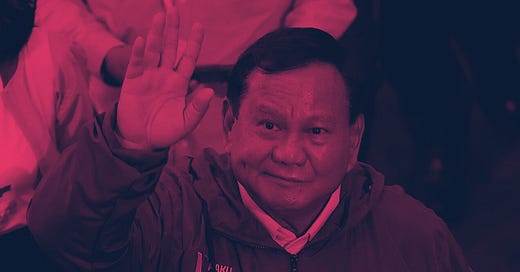What a Prabowo Presidency Means
I’d chalk this up as a correct prediction, given Prabowo is now insisting on bringing the military back into civil society in Indonesia. He also fancies the purchase of an Italian aircraft carrier.
Recent polling indicates that Indonesia’s upcoming presidential election is now Prabowo Subianto’s to lose. The current defence minister and ex-special forces commander has gained an assertive lead over opponents Ganjar Pranowo and Anies Baswedan, having leapt forward in opinion polling after controversially appointing Gibran Rakabuming, the mayor of Surakarta and son of the highly popular outgoing President Joko ‘Jokowi’ Widodo, as his running mate. With the first round of voting in less than a month, it is pertinent for those invested in Asia–Pacific multilateralism to begin analysing what a Prabowo presidency could mean for the relationship between Indonesia and Australia.
Prabowo’s legacy as defence minister has been the proliferation of military equipment (including a scuttled deal for fighter jets beyond the capacity of Indonesia’s budget), primarily financed by foreign debt. Prabowo vigorously defended his policy record in the third presidential debate as essential for maintaining national sovereignty. While Indonesia’s election has been characterised less by cerebral policy discussions and more by social media campaigns to appear the most Jokowi-esque, it seems that increasing the nation’s defence capacity through armament will be a crucial policy of Prabowo. This is to be expected after the 72-year-old’s lifetime of often callous military experience, for which he has been accused of numerous human rights violations both internally by the National Commission on Human Rights and by NGOs such as Amnesty International.
In recent years, Australia and Indonesia have become non-entities as security partners in the minds of their populations. The 2023 State of Southeast Asia Survey Report conducted by the ISEAS–Yusof Ishak Institute found that a mere 0.8% of Indonesians surveyed felt that Australia provided them ‘the most confidence in providing leadership to maintain the rules-based order and uphold international law.’ – a pallid percentage lower than that of the United Kingdom (6.6%), South Korea (2.5%) or even New Zealand (1.7%). This lukewarm response was matched in Australia by a 2023 poll conducted by the Lowy Institute, which found Australians felt less warmth toward Indonesia than nations further to the periphery of Australia’s security goals, such as the Philippines or South Korea. This comes despite Australian Prime Minister Anthony Albanese attesting that ‘There is no more important relationship than the relationship between our two great nations.’ at a joint meeting last July.
This cool-headed relationship is partly due to the lack of crises demanding active cooperation and the warm friendship between Widodo and Albanese. Prabowo, having successfully remodelled himself as Jokowi’s man, may well seek to maintain the status quo of benign cordiality. However, he could also quickly seek to differentiate himself from his predecessor post-election, as Jokowi himself did from PDI-P party boss and former Indonesian president Megawati Sukarnoputri in 2014. Suppose that upon entering Bogor Palace, Prabowo returns to the populist and strongman rhetoric of his previous presidential campaigns in 2014 and 2019. In that case, offering a sharp public rebuke to Australian military initiatives such as AUKUS may be seen as a low-cost approach to increase nationalist fervour due to the Indonesian population’s widespread apathy to Australia’s security role in the region.
In sum, the Jakarta/Canberra axis seems ill-equipped to handle upcoming tests, like the expected addition of nuclear-powered submarines to Australia’s fleet, in a cooperative and even-handed spirit. In the highly likely event of a Prabowo presidency, Australians and other observers of the Asia–Pacific should pay much closer attention to Indonesian foreign and defence policy than they have during Jokowi’s decade in office.





